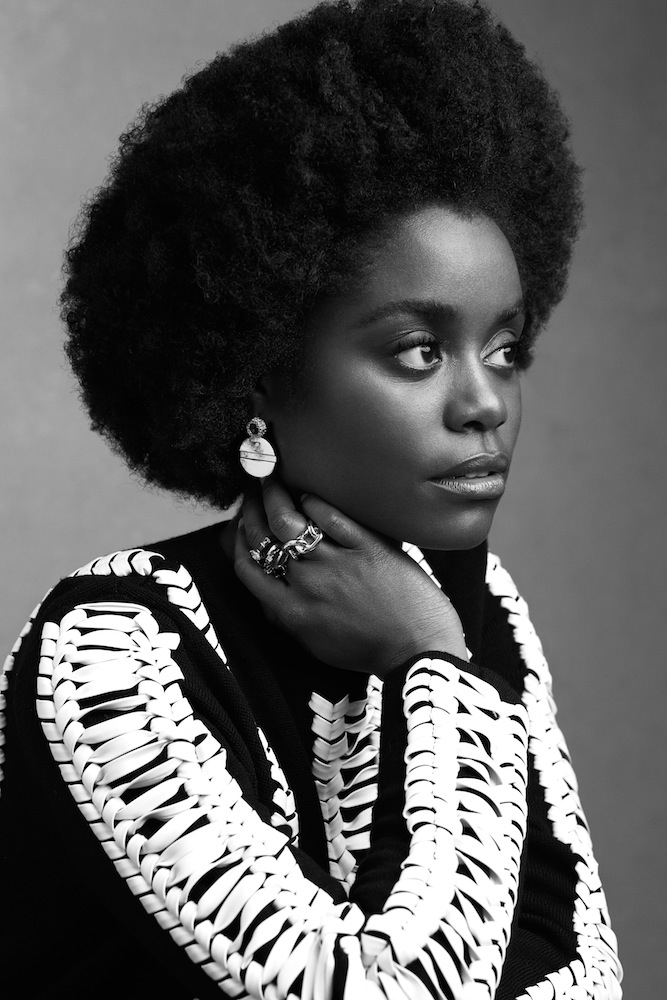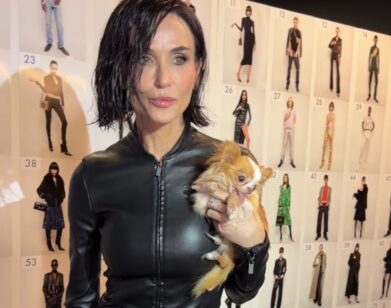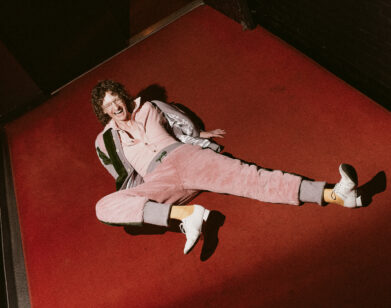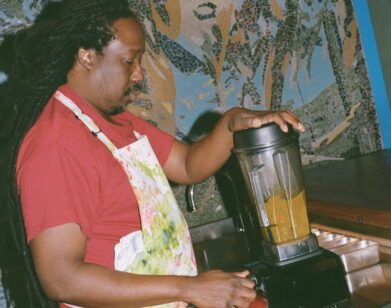The Broadway Heroine
DENÉE BENTON IN BROOKLYN, NOVEMBER 2016. PHOTOS: LARA JADE. STYLING: MIMI KIM. HAIR: LACY REDWAY/THE WALL GROUP. MAKEUP: KIM WEBER USING SURRATT.
Natasha, Pierre & the Great Comet of 1812, Dave Malloy’s Broadway musical, begins in the middle of Tolstoy’s epic novel War and Peace: Natasha is engaged to the widowed Andrey Bolkonsky, who, at the request of his father, is away traveling for a year; Pierre and Hélène Kuragina are married and fighting; Anatole Kuragin is galavanting about Saint Petersburg with Dolokhov; Sonya and Mary Bolkonskaya are being their sweet, pious selves. It’s a lot to take in, but Malloy’s tongue-in-cheek opening number makes it easy, and sets the tone for the rest of musical. “Mary is plain, Dolokhov is fierce, Hélène is a slut, Anatole is hot, Marya is old-school, Sonya is good, Natasha is young, and Andrey isn’t here,” the show’s chorus sings, dancing in the audience on and off a sprawling, cabaret-like set.
“Dave talks about how he originally wrote that song out of spite,” says 24-year-old actor Denée Benton, who plays Natasha in the show. “In the first couple of iterations, people would be like, ‘I don’t know what’s going on. Who is that?'” she continues. “He wrote it, really pissy at home: ‘This is all in your program. You’re at the opera. Study up a little bit, it’s going to get complicated,’ which I just love.”
Last month, following a four-year journey, The Great Comet officially opened at the Imperial Theatre on West 45th Street to rave reviews. It originally ran at Ars Nova in 2012, before moving around several different venues in New York City, and transferring to the American Repertory Theatre in Cambridge, Massachusetts in December of last year. There have been a few casting changes along the way, too, with Benton replacing Phillipa Soo as Natasha before Cambridge, and Josh Groban joining for the Broadway run. “As an actor, stability is great, but stability is also great with a wonderful show,” Benton explains. “I always say, I feel like the show is a star in its own right.”
For Benton, Natasha is the latest step in an impressive post-college whirlwind. The Florida native graduated from Carnegie Mellon’s musical theater program in 2014, and went straight into a tour of The Book of Mormon. Earlier this year, she had her first television show arc as an activist named Ruby on UnReal. “I would definitely love to do a feature film next,” she tells us. “It’s my dream to get to do all of the mediums for the rest of my career—a play, musical, TV, film, so film is certainly next on my list because I haven’t done it yet.
HOMETOWN: Winter Park, Florida.
ALMA MATER: Carnegie Mellon University. [On Broadway], they jokingly call it the “CMU Mafia.” Especially around Tony season, CMU will always host a party, and it actually is really comforting. There are people that I’m thinking about reaching out to now to figure out how to balance this time in my life.
GROWING UP: I just loved singing and acting. I did the church plays, the school plays, county chorus—basically any artistic thing that my school offered, I was a part of. It was always my dream to end up doing this, but none of it was ever strategic. It was just what I loved to do. My parents, once they saw my interest in it, were really supportive. They started getting me voice lessons, and if there were drama camps, they were supportive with the resources that we had to invest. Most of my family—my aunts and uncles, cousins—sing in church. They just have beautiful voices. But my dad’s a businessman; my mother was in TV broadcasting and now she has her masters in counseling.
UNDERSTANDING THE BUSINESS: I went to a really academic high school, and so I didn’t necessarily have the confidence to go to theater school—or I didn’t think I was going to be good enough, or didn’t even know. Then the summer before my senior year, I did this play at my high school, and I just really built confidence. I had a couple friends who were applying to acting conservatories, and I had just done this program—the NAACP has this thing called ACT-SO for students, and it’s sort of like an Olympics of the mind. There’s arts and there’s a science fair, and all these things, and I did that. That was the first time I was in a professional setting. They had actors come in and do master classes with us, and I learned about acting conservatories, I learned about agents. I just learned about the world. Before, I was like, “How does anyone do this?” That helped, and then doing that show, I was like, “Oh, I can do this.” I threw my college stuff out the window and just Googled the top acting programs.
CHOOSING CMU: My audition for Carnegie Mellon, it was one of those moments where both my mom and I were like, “We feel like this is the place”—that feeling you get when something’s right. It was a huge leap of faith; for my musical theater major, they only accepted 13 students. I was so ignorant. I applied to five schools. I just didn’t know any better, [but] I’m kind of thankful that I didn’t know any better. It all worked out.
THE BOOK OF MORMON BALANCING ACT: I got to graduate, but did an “internship” with The Book of Mormon. That was what it was called. [laughs] The timing was crazy. I got offered The Lion King on tour the year before, but I wouldn’t have been able to graduate because I would have been gone for a whole year. My teachers were like, “If they let you go for a semester, we’ll let you do it,” but they wouldn’t, so I passed on it because I wanted to graduate. Then The Book of Mormon came around, and it was only going to be one semester, so I was like, “Remember how you said…” I don’t know if they were ever planning on having to live up to that promise, but it all worked out. It was just a bigger moment career-wise. I didn’t get to do my showcase with my school, which is how you get an agent and things like that, and so I wanted to make sure it was an opportunity that would still lead me in a similar direction.
JOINING NATASHA, PIERRE & THE GREAT COMET OF 1812: They held auditions in April of 2015, because they had an opening for Natasha. I auditioned, went through the callback rounds, and then found out a couple months later that I got it. I was in London at the time doing Book of Mormon when I found out. I was very excited. I had no clue if it was moving to Broadway, when it was moving to Broadway, but the show was so special that I just really wanted to be a part of it.
THE MISUNDERSTOOD HEROINE: I actually really relate to Natasha. I relate to how much she is in love with life and the world, and it’s a test—Andrey leaves her for a year. He listens to his dad and he leaves her. It’s not now; they’re not FaceTiming. She’s getting a letter maybe once a month. I have more compassion, also having been in a long distance relationship, for what it’s actually like to be distracted by your surroundings and sort of this out-of-sight, out-of-mind quality. It’s the first person she’s ever loved that deeply. I get why this hot guy could come along and distract her. In the book, there are all these lines like, “I can’t remember what he looks like. I can’t remember his face. I can’t remember his touch.” That’s tough. Then Anatole comes along, and it’s like, “Well, I can touch him.” And for her to actually feel that sexual desire in a real way … I think Andrey touches her in a place of love and being cared for, but when your girl starts to jump for the first time, it’s a shocking feeling.
MID-SHOW RITUALS: One of my castmates and I sing a song before Act II, and we’ve done it before every show, so I’m afraid to not do it. We sing this Usher song, “U Make Me Wanna,” because we’re joking that that’s what Natasha’s going through with Anatole. We don’t even let them open the doors—I’ve told the stage managers that we have to sing this song before we go on stage. It’s a part of the cue sheet.
STORYLINES THAT MATTER: I loved the fact that, as Natasha, I get to represent this archetypal woman, this woman of beauty, me being a dark-skinned black woman. Also with Ruby, [my character on UnReal], her getting to be the center of that love story—the quote-unquote “angry black woman” never really gets to do the love story. So I love the inclusion there. As a little girl growing up, there’s a real fear that you’re never going to be loved in that way because you don’t see yourself being loved in that way. I’m excited for this being part of a paradigm shift. [Growing up,] I loved watching romances; The Notebook, Titanic, When Harry Met Sally, all of those movies were movies I was obsessed with, but there are no people of color being loved and being idolized—or being anything—in those films. So when you’re in your formative years developing crushes, and you’re a hopeless romantic like I am, you’re very heavily influenced by that. I remember movies like the Brandy-Whitney Cinderella, which I would watch over and over again. When I was little, I didn’t have the vocabulary to understand why I was so attracted to it, but now I know why: it was this beautiful story, I saw myself, I saw so many people in it. Those stories slowly but surely gave me the confidence to subliminally see myself in things being possible.
NATASHA, PIERRE & THE GREAT COMET OF 1812 IS NOW ON AT THE IMPERIAL THEATER IN NEW YORK CITY.
For more from our “Faces of 2017” portfolio, click here.







